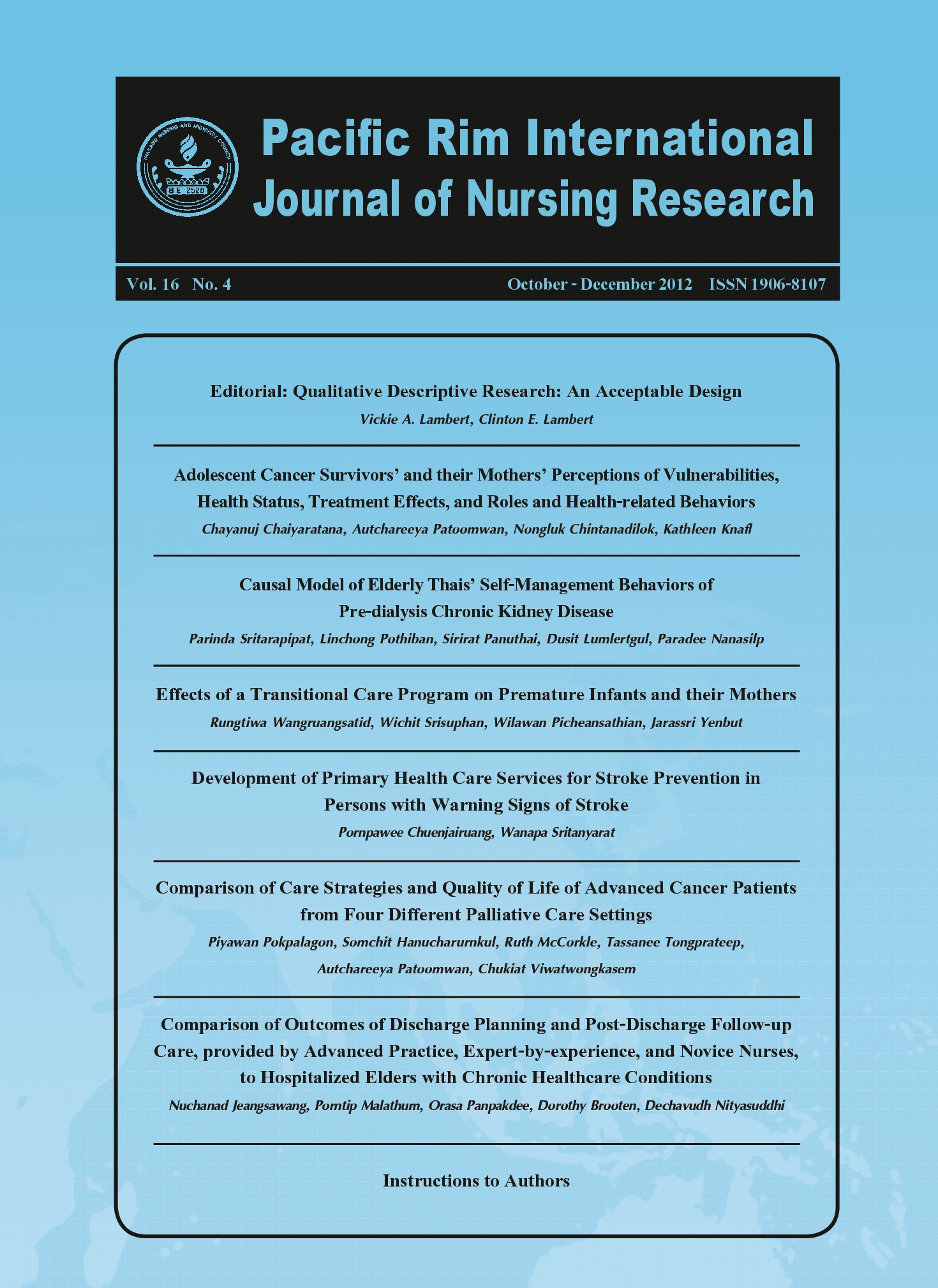Causal Model of Elderly Thais’ Self-Management Behaviors of Pre-dialysis Chronic Kidney Disease
Keywords:
Self-management, Elderly Thais, Pre-dialysis chronic kidney disease, Causal modelAbstract
บทคัดย่อ
การศึกษาเชิงพรรณนาแบบภาคตัดขวางครั้งนี้มีวัตถุประสงค์เพื่อทดสอบปัจจัยที่มีอิทธิพล ทางตรงและทางอ้อมต่อการจัดการตนเองของผู้สูงอายุไทยที่เป็นโรคไตเรื้อรังระยะก่อนการบำบัดทดแทนไต โดยแบบจำลองสมมติฐานเชิงสาเหตุในการศึกษานี้ใช้แนวคิดการจัดการตนเองในโรคไต เรื้อรังของเคอร์ทีนและมาเปสและทฤษฎีสมรรถนะแห่งตนของแบนดูรา กลุ่มตัวอย่างถูกคัดเลือกโดย วิธีการสุ่มแบบหลายขั้นตอน คือ ผู้สูงอายุที่เป็นโรคไตเรื้อรังระยะที่ 3 ถึง 5 ก่อนการบำบัดทดแทนไตจำนวน 216 ราย ที่มาตรวจตามนัดที่คลินิกอายุรกรรมในแผนกผู้ป่วยนอกของโรงพยาบาลสังกัด กระทรวงสาธารณสุขระดับปฐมภูมิ 4 แห่ง และระดับทุติยภูมิ 2 แห่งในสองจังหวัดเขตภาคกลาง การเก็บข้อมูลใช้แบบสอบถามจำนวน 8 ฉบับ การวิเคราะห์ข้อมูลใช้สถิติเชิงพรรณนา สถิติสหสัมพันธ์เพียร์สัน และสถิติการวิเคราะห์โมเดลสมการโครงสร้าง ผลการศึกษาแบบจำลองเชิงสาเหตุของพฤติกรรมการจัดการตนเองโดยปัจจัย 6 ปัจจัย ประกอบด้วย สมรรถนะแห่งตน การทำหน้าที่ด้านร่างกายในการทำกิจวัตรประจำวันขั้นสูง ความรู้เกี่ยวกับโรคไตเรื้อรัง การสนับสนุนจากครอบครัวการทำหน้าที่ด้านสติปัญญาและการสนับสนุนจากบุคลากรสุขภาพสามารถอธิบายความแปรปรวนของพฤติกรรมการจัดการตนเองของผู้สูงอายุไทยที่เป็นโรคไตเรื้อรังระยะก่อนการบำบัดทดแทนไตได้ร้อยละ 47.23 โดยสมรรถนะแห่งตน การทำหน้าที่ด้านร่างกายในการทำ กิจวัตรประจำวันขั้นสูง ความรู้เกี่ยวกับโรคไตเรื้อรัง และการสนับสนุนจากครอบครัวมีอิทธิพลโดยตรงทางบวกต่อพฤติกรรมการจัดการตนเองอย่างมีนัยสำคัญทางสถิติ (p < .05) ส่วนการทำหน้าที่ด้านสติปัญญาและการสนับสนุนจากบุคลากรสุขภาพมีอิทธิพลโดยอ้อมทางบวกต่อ พฤติกรรมการจัดการตนเองโดยผ่านสมรรถนะแห่งตนอย่างมีนัยสำคัญทางสถิติ (p < .05) นอกจากนี้ สมรรถนะแห่งตนเป็นปัจจัยสื่อกลางระหว่างพฤติกรรมการจัดการตนเองและปัจจัยทำนายอื่น
คำสำคัญ: การจัดการตนเอง/ ผู้สูงอายุโรคไตเรื้อรังระยะก่อนการบำบัดทดแทนไต แบบจำลองเชิงสาเหตุ
Abstract
This cross-sectional, predictive study aimed to examine factors, directly andindirectly, affecting elderly Thais’ self-management behaviors of pre-dialysis chronickidney disease. A hypothesized causal model, based on Curtin and Mapes’s frameworkfor self-management in chronic kidney disease and Bandura’s self-efficacy theory, wasused to guide the study. Multistage random sampling was employed to obtain 216elderly Thais with pre-dialysis chronic kidney disease from six outpatient clinics in fourpublic primary hospitals and two secondary hospitals located within two central Thaiprovinces. Data were collected, via eight instruments, and analyzed using descriptivestatistics, Pearson’s product moment correlation coefficient and structural equationmodeling using the Generalized Least Squares technique in the LISREL program.
The results indicated six significant predictors (self-efficacy, physical function ininstrumental activities of daily living, knowledge about chronic kidney disease, socialsupport from family, cognitive function and social support from health care providers)explained 47.23% of variance in the subjects’ self-management behavior. The subjects’self-efficacy, instrumental activities of daily living, chronic kidney disease knowledge andsocial support from family had a direct positive effect on their self-management behavior.The subjects’ cognitive function and social support from health care providers werefound to have an indirect positive effect on the subjects’ self-management behavior viaself-efficacy. Moreover, the subjects’ self-efficacy was found to be a mediator betweenself-management behavior and the other predictors.
Key words: Self-management; Elderly Thais; Pre-dialysis chronic kidney disease; Causal model
Downloads
How to Cite
Issue
Section
License
Copyright: The Pacific Rim International Journal of Nursing Research, Thailand Nursing & Midwifery Council has exclusive rights to publish, reproduce and distribute the manuscript and all contents therein.







.png)


